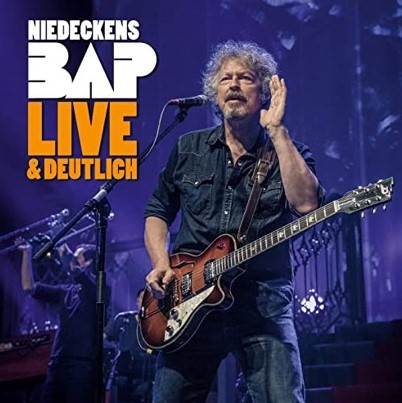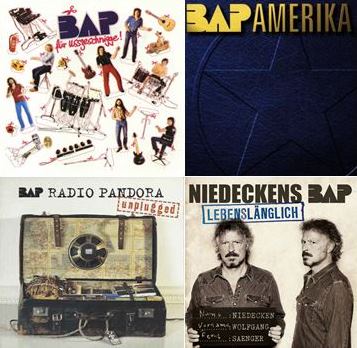I realize writing about a rock band singing in German may be a bit of a tough proposition for most of my readers who it’s safe to assume don’t understand the language. But Niedeckens BAP aren’t just any group, plus when I started listening to English music as an eight-year-old back in Germany, I didn’t know or understand one word of English. All I was reacting to were melody, sound, groove and the quality of the vocals. To this day, these aspects remain more important to me than lyrics in most cases.
If you’ve been a more frequent visitor of the blog, chances are you’ve seen me gush about Niedeckens BAP, or simply BAP as they used to be called. Founded as Wolfgang Niedecken’s BAP in the west German city of Cologne in 1976, the group around singer-songwriter Wolfgang Niedecken became the first German-singing rock band I closely followed starting in 1980. More precisely, they perform their songs in Kölsch, the regional dialect spoken in the area of Cologne. Last Friday (April 26) saw the release of Zeitreise (Live im Sartory), a live album focused on the group’s music from the early ’80s.
As a longtime fan, Zeitreise is a pretty emotional experience to me, taking me back to Germany when I was 14 and, as noted above, discovered BAP. The material was captured during four shows the group played on December 7, 8, 9 and 10, 2023 at the so-called Sartory-Säle (Sartory Halls), one of the biggest entertainment venues in the center of Cologne. This place has special meaning to BAP. Between 1980 and 1984, they performed many gigs there.

The idea to revisit BAP’s past with a series of concerts at Sartory emerged during their 2022/2023 tour in support of their most recent studio album Alles Fliesst (everything is groovy) from September 2020, which I covered here at the time. “It was during songs like ‘Zehnter Juni’ (June 10) or ‘Jupp’ (a German first name – CMM),” Wolfgang Niedecken told local German newspaper Kölner Stadt-Anzeiger. “As I was scanning the audience, I noticed what these songs did to people. How they moved them.”
Shockingly, I can offer you more background on BAP. Perhaps the best overview is this post from February 2020. Now, I’d like to get to some music from Zeitreise, which by the way means something like journey back in time – sort of what I call ‘music time travel’ in my Sunday feature! While I wouldn’t necessarily go as far as characterizing the songs as reimaginations, they are new renditions of old tracks, which reflect the group’s different musical line-up.
I’d like to kick it off with Südstadt, verzäll nix (don’t give me BS, south city), a song criticizing what Niedecken felt was the commercialization of Südstadt, a part of Cologne. The song first appeared on Für usszeschnigge! (to cut out), BAP’s third studio album from October 1981, which became their national breakthrough in Germany. Typically, Niedecken writes all lyrics, while the music is credited to one or more of the band’s other members. During their first two decades, most of the music was provided by Klaus Heuser, the band’s guitarist from 1980 to 1999. As their de facto musical director, Heuser largely shaped BAP’s sound during his tenure.
Nit für Kooche (not even for cake) is a track from BAP’s album Vun drinne noh drusse (from the inside to the outside), the successor to Für usszeschnigge!, which was released in August 1982. The song is making fun of Karneval, a festive season between November 11 and Ash Wednesday, which is celebrated particularly in Cologne and the broader region of the Rhineland. During what is also known as the “fifth season of the year”, people costume and go to special events and parades. And, yes, lots of alcohol is involved as well. Some including Niedecken consider it as largely forced and superficial happiness.
A concert revisiting BAP’s music of the early ’80s cannot skip what I would call the band’s most popular song. In Verdamp lang her (It’s been a long time), another track from the Für usszeschnigge! album, Niedecken recalls what oftentimes were difficult conversations with his father where the two of them had a hard time connecting. It also includes the band’s namesake, “bap,” which means “dad” in Kölsch dialect.
I’d like to call out one additional track: a medley of Wahnsinn (madness)/Häng de Fahn eruss (get the flag out). Wahnsinn is a cover of Wild Thing, a song penned by Chip Taylor and first popularized in 1966 by British invasion outfit The Troggs, with completely re-written lyrics. It was included on the group’s November 1979 debut album Wolfgang Niedecken’s BAP rockt andere kölsche Leeder (Wolfgang Niedecken’s BAP rocks different Kölsch songs). Häng de Fahn eruss, a fun rock & roller, is an original song from Affjetaut (defrosted), which was the band’s second album that came out in 1980.
Long-running German TV music program Rockpalast produced a special broadcast that captures most of Niedeckens BAP’s concert at Sartory. It’s currently available on YouTube – not sure for how long. Needless to add I watched all of it and loved every minute. It may well be the closest for me to ever see the band live again!
As you might imagine, BAP have seen many changes over the decades. Co-founder and frontman Wolfgang Niedecken remains the only original member. While he has always been surrounded by great musicians, I think the band’s current line-up is their best. Apart from Niedecken (vocals, guitar), it features Ulrich Rode (guitar, banjo, mandolin, backing vocals), Michael Nass (keyboards, Hammond organ, backing vocals), Anne de Wolff (violin, cello, mandolin, lap steel, guitar, percussion, vocals), Werner Kopal (bass, backing vocals), Sönke Reich (drums), Axel Müller (saxophone, guitar), Benny Brown (trumpet) and Johannes Göltz (trombone).
Last but not least, if you like what you’ve heard, here’s a Spotify link to the album. As as BAP fan from Cologne might say, “dat ess affenjeil” (that’s frigging awesome)! 🙂
Sources: Wikipedia; YouTube; Spotify









